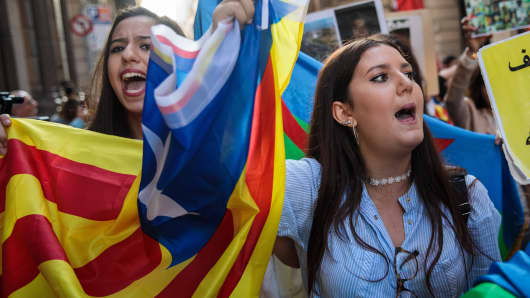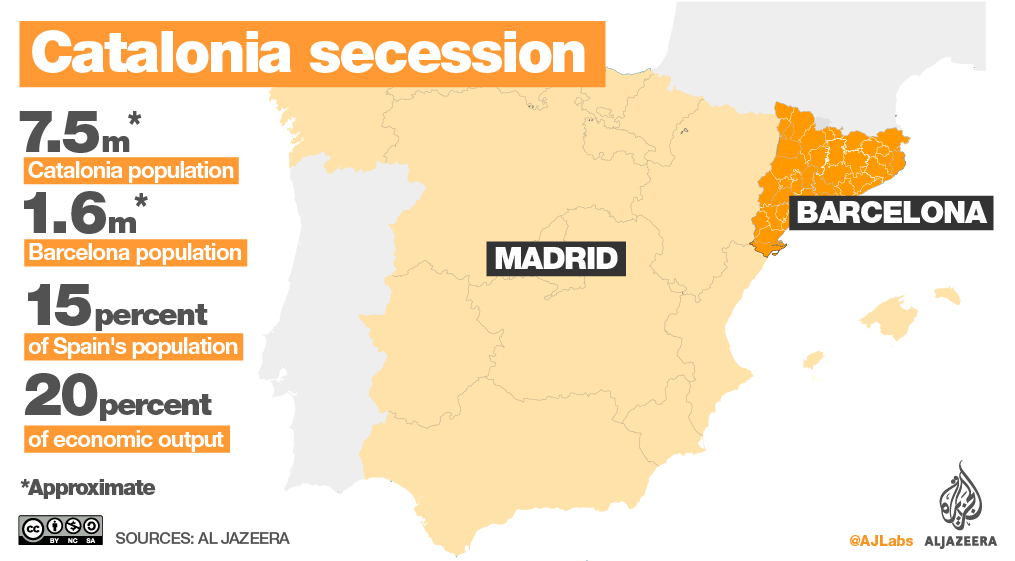Catalonians Yearning To Be In Charge
"The financial crisis [of 2008] made Catalans angry, that as a rich area they were suffering because they had no control over the economic levers."
"[Many moderate Catalan nationalist were pushed toward independence when 13,000 businesses in Catalonia succumbed in 2009]."
Andrew Dowling, specialist in Catalan history, Cardiff University, Wales
"I don't know -- the Catalan government says they are in charge, but the Spanish government says they are."
"So I have no idea, really. What I really think is that nobody is in charge right now."
Cristina Guillen, Girona, Spain
![Catalonia's long push for independence Estelada is the one-starred Catalan flag used to represent an independent Catalan republic [Yves Herman/Reuters]](http://www.aljazeera.com/mritems/imagecache/mbdxxlarge/mritems/Images/2017/10/31/ae611645a38f498dad1b70fd03a5541d_18.jpg) |
| Estelada is the one-starred Catalan flag used to represent an independent Catalan republic [Yves Herman/Reuters] |
There is some justification for how Ms. Guillen and others like her feel; mystified and disoriented. Catalonia's former president and most of his ruling council are now in Belgium, they've walked away from the central Spanish government's decision to charge them with rebellion, sedition and embezzlement. Carles Puigdemont, dismissed by the government in Madrid after the Catalan regional parliament voted to declare independence on Friday, has hastened to assure his people that the issue is not resolved; Catalonia will reach its goal of independence.
Even while Spain's chief prosecutor Jose Manuel Maza is preparing to see the Supreme Court enact preventive measures to ensure the Catalan parliament's governing body will be unable to resume its tack for independence. Their arrest and detention before trial has been somewhat complicated, however, by their sudden absence from Spain and surprising appearance in Belgium where Carles Puigdemont, his second-in-parliament Oriol Junqueras and parliamentary speaker Carme Forcadell have sojourned to Brussels.
Barcelona's residents may be undergoing second thoughts, but not so the regions of Catalonia where people there of Catalan descent bask in the impression that they already inhabit an independent republic of Catalonia. Separation from Spain cannot come soon enough. "I've never felt Spanish in my life", graphic designer Anna Faure declared in Girona, celebrating its patron saint's annual festival. The northeastern region with its 7.5 million population feel that language, history and cultural traditions separate it from Spain.
 |
Jack Taylor | Getty Images Moroccan Rif activists carry a Catalan
independence flag during a demonstration outside the Catalan Government
building, the Palau de la Generalitat on October 28, 2017 in Barcelona,
Spain. The Spanish government stripped Catalonia of its autonomy after
the Catalan parliament voted Friday to declare independence.
|
"We [Catalans] wouldn't have arrived at this point if they [Madrid] had treated us well for many years", stated Judit Alguero, reflecting a popular emotion among Catalans that Madrid authorities have neglected and as well, expressed hostility to Catalan aspirations. When Francisco Franco ruled Spain in the years 1939 to 1975, he banned official use of the Catalan language and imprisoned and executed opposition politicians and activists during his dictatorship's repressive era.
On his death, Spain veered toward democracy granting Catalonia a measure of autonomy with its own police force, a regional government and control of education where public schools were once again permitted to teach primarily in Catalan, and national symbols could finally be seen in the public arena. In recent years, the global economic crisis and a steadily emerging hostility between Barcelona and Madrid left Catalans nursing a grievance and thinking in terms of separatism.
In 2006, an autonomy agreement was reached whereby Catalonia was granted the status of a nation within Spain, with its own tax-raising powers -- later to be struck down by Spain's constitutional court in 2010, and protests of unfairness and anger were triggered. In the wake of the 2008 financial crisis, unemployment rose and the country saw itself in financial crisis, even while Catalonia was one of the country's wealthiest regions and aggrieved that it receives little recognition, despite paying more than its share into Spain's general fund.
In 2014 a pro-independence coalition was elected to the Catalan parliament, promising to plan for secession. Still, only 43 percent of the electorate turned out for the October 1 referendum seeking a mandate to separate. Simply put, pro-union voters decided not to vote when Madrid sent in its police with orders to shutter polling stations, clashing with Catalan police who supported the referendum. The Spanish police did the pro-union cause no favours when they violently executed their orders to prevent the vote from proceeding.
On the other hand, there are ample pro-union Catalans who regard themselves as a silent majority, where supporters of independence are anything but silent.

Labels: Catalonia, Conflict, Independence, Spain

<< Home